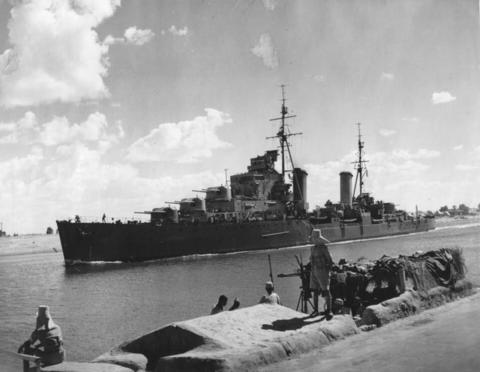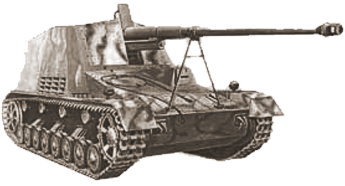How the British Strategic Position in 1942 Highlights The Mediterranean Theater's Role in Undermining Germany's Schwerpunkt

I have often and long argued that the Mediterranean Theater of the War became not just a crucial drain on Nazi Germany's efforts during the Second World War - but perhaps represented the primary cause Hitler's war machine failed to lock down a long-term strategic advantage in Eastern Europe during 1942. There are numerous reasons why this is true. This month I would like to further develop a few of those elements. However, to do so we must look first to the British strategic position early in 1942 - given the British Commonwealth forces represented Germany's primary foe in the Mediterranean throughout 1942 and regardless of U.S. entry into the war very late in 1941.
In the spring of 1942 the Commonwealth forces fighting as part of the British 8th Army found themselves on a defensive front just west of Tobruk (the Gazala line). To that date the 8th Army's performance in the North African desert campaign had been less than exemplorary. On the other hand, the RAF (Royal Air Force) led Western Desert Air Force under the command of Air Vice-Marshal Arthur Conningham (himself under the command of the overall Middle East air commander - Air Marshal Sir Arthur Tedder) had fought well and was holding it's own against the combined Axis air forces. Nevertheless, the 8th Army's position barely inside the eastern Libyan border represented a bitter failure to Winston Churchill, who was hardly impressed with his premier army's efforts or leadership.
Though buoyed by U.S. entry into the war, the British Prime Minister didn't have much else to be happy about. The U.S. Army or Army Air Force wouldn't be ready to make a real contribution to the Allied war effort over Europe or in the Mediterranean until late in 1942. This meant the British and Commonwealth forces (from hereout "British" for simplicity's sake) would again bear the brunt of the combat in the European and Mediterranean theaters of operation. Meanwhile, the Red Army was barely hanging on in an all-out slug fest against the overwhelming strength of the Wehrmacht. At the same time the Japanese war machine was sweeping all before it in the Pacific and Southeast Asia, with the British military enduring one disaster after another. The British fleet had been hammered with the loss of The Prince of Wales and Repulse the worst of it, but hardly the only blows the Royal Navy took against the Imperial Japanese Navy. On the ground, the all-too short Battle of Singapore had ended in February with 80,000 British, Australian, and Indian troops falling into captivity (this coming on the heels of over 50,000 Allied troops taken as prisoner's of war in the Malayan campaign). All of which put India at risk of Japanese invasion.
Over Europe not only was the RAF's Bomber Command floundering in it's expensive efforts to damage, no less cripple, the German war economy - but there was little else the British could do over or in Europe. Even if the British could marshal the combined power of the Commonwealth along with whatever U.S. forces could be scraped up, there was no way the Allies could launch a successful invasion of north-west Europe in 1942. As it was German U-boat's were sinking Allied shipping at catastrophic rates. On top of that, Allied material aid to the Soviet Union was still ramping up when in the summer of 1942 one of the three primary Allied supply routes into Russia had to be shut down due to the near complete destruction of Convoy PQ-17. Moreover, British material support for the Soviet war effort came at the cost of the Allied military effort in the Mediterranean and Asia.
Nevertheless, Britain did enjoy one huge advantage over the European Axis powers. As previously described the Mediterranean represented the sole theater of operations where Britain could successfully distract and meaningfully wear down the German led Axis war effort. This was a task Britain had to take on, as a failure to do so could mean catastrophe for the Allies. Though the addition of the U.S. as an active participant in the war was a shot in the arm for Britain and Russia, the Allies were on the ropes in 1942. Things were so bad for the Soviet Union that Stalin was actively considering trying to forge a peace treaty with Germany. It was thus imperative for Britain to not allow Germany to concentrate the full weight of it's imposing armed forces in Eastern Europe. North Africa was that ticket to British success.
Some point to the see-saw nature of the Desert war from 1940-1942 as indicative of British military weakness or strategic folly. Nothing could be further from the truth. Britain never needed to defeat Axis forces in North Africa. All Britain had to do was tie down significant Axis forces in an infrastucture poor region thereby creating a resource intensive and logistically draining battle that would prevent Germany from providing the backing neccessary toward making Operation Blue (German Army Group South's strategic drive on the economic resources fueling the Red Army, which began during the summer of 1942) a success. This is not to mean that any of this was easy for the British to accomplish. In fact, the British struggles in waging an effective campaign in North Africa are instructive for those still clinging to the fanciful belief that Germany's Wehrmacht had the means to not only decisively defeat the British in the Mediterranean littoral - but follow such a victory with a grandiose sweep across North Africa and the Middle East. This is true even though the Italians enjoyed a premier position astride the Central Mediterranean providing access to munitions factories as well as ample logistical and maintenance support for the Axis armed forces deployed in the region. Nevertheless, this also meant little once Axis forces penetrated deep into Egypt. The distance from Suez to Axis occupied Crete was over 500 miles, to Athens nearly 750 miles, while Rome was nearly 1,200 miles from Suez. If one really wants to talk about Axis forces reaching the Allied oil fields in the Middle East then we are talking another roughly 750 miles east of Suez. Moreover, given the lack of roads and rail lines in the region that mileage meant any prospective conquerer needed shipping and lots of it - along with the means to adequately protect that shipping.
The British faced the same tyranny of distance and were able to defeat it, but it is instructive why. The combined Axis navy's and merchant marine were a mere shadow of the imposing Royal Navy (see the picture here of the British Light Cruiser HMS Euryalus in the Suez Canal) and thousands of merchant ships supporting the British war effort. Though that effort was spread across the Atlantic and into Asian waters, British naval forces could mostly wage war on an effective level in all three theaters of combat (assuming U.S. support throughout). Moroever, the British had poured immense resources into the Royal Air Force.
It was this immense Allied productive and logistical effort that helped enormously in maintaining Allied hitting power in North Africa and the Mediterranean. This included assembling imposing logistical and administrative resources, weapons depots, personnel holding units, training units, air bases, naval bases, ports, maintenance and repair facilities, and so on. Cairo and Alexandria had become seething hubs of activity playing a key role in turning around worn out or damaged weaponry and bringing it back to operational status (especially airplanes as many aircraft forced down or badly damaged were able to be repaired and returned to their parent formations) as well as funnelling west supplies and replacement personnel all needed to keep the 8th Army and Malta in the war. As a result the British were able to replenish their forces far more quickly than could the Axis.Yet, even though the British won the logistical battle they still struggled to maintain their fighting power in the seas surrounding Malta plus whenever 8th Army penetrated west into Libya.
For those thinking there was little stopping the Axis from replicating such an effort that's simply not true. Benghazi and Tobruk couldn't come close to comparing to the British ports in Egypt in terms of capacity or location. To find Axis ports and supply centers comparable to what the British had built up in the Eastern Mediterranean one had to look west and northwest over one thousand miles - to Tripoli and Naples respectively. Furthermore, the British logistical and adminstrative backing for it's Mediterranean war machine had taken years to build, and by 1942 was heavily supported by streams of U.S. made equipment and resources. It is outlandish to think that Axis forces could have just swept through to Suez and enjoyed similar advantages. In spite of the strong backing British combat units enjoyed they also still only held limited-time advantages over Axis forces. Time and again the fighting over Malta, in the Mediterranean, and in North Africa ebbed and flowed back and forth with whichever army fought from positions nearest to it's supply base or had just received the latest replenishing shot in the arm the army holding the edge. Such army or air force almost always then defeated its foe. However, since neither side had the resources available to overwhelm the other these temporary victories merely started the next cycle of pursuit, entrenchment, defeat, retreat, rejuvenation, and then another go at taking the offensive.
It was this grinding battle that really damaged the Axis war effort, causing just enough resources to be diverted from Russia at a time when the Soviet Union was tottering on the brink of being relegated to a secondary player in the war. All of which further shows that if the lavishly supplied and supported British still struggled, how would one have expected Axis forces with relatively far weaker and badly positioned maritime power projection assets to have peformed in the same region. Once again this helps us understand how much the fighting in the Mediterranean really was a strategic dead end for the Axis at a time when the far more important fight in Southern Russia and the Caucasus demanded the Wehrmacht's full attention.



Post new comment